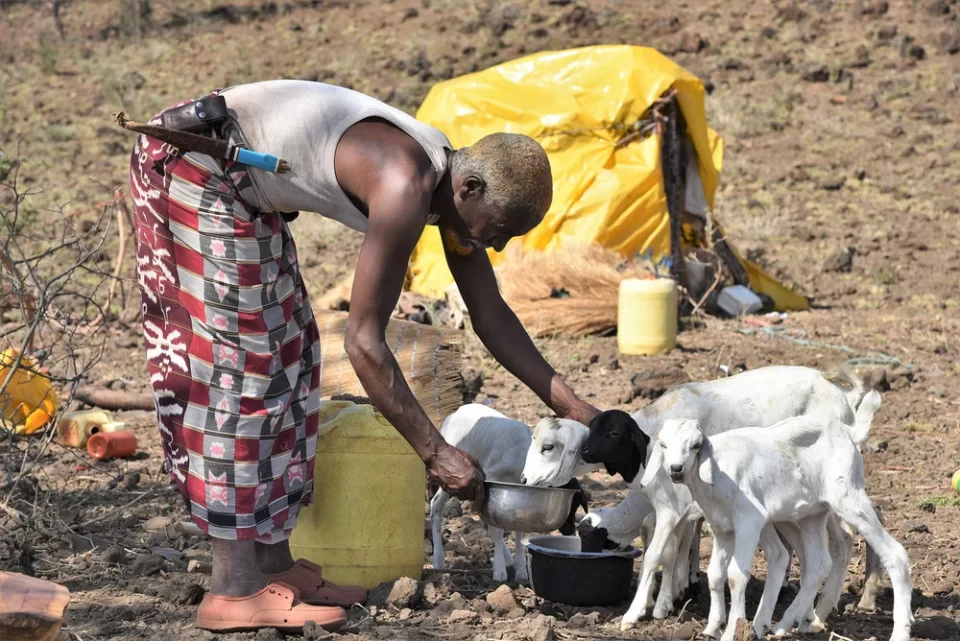In his inauguration speech in early June, the new president of Somalia, Hassan Sheikh Mohamud, called attention to the grave threat of famine posed by the severe drought affecting the Horn of Africa. His plea for action echoed those of humanitarian organizations, which have been warning that the worst drought in 40 years presents a major crisis for the region, with millions already facing extreme hunger.
Rains have now failed across four rainy seasons in the region, devastating harvests, decimating livestock, and forcing millions to leave their homes in desperate search for food. While the main worry is how to cope with the crisis and provide support right now, the fear is that the situation will only worsen, especially if the rains continue to fail.
Although the wider Horn of Africa region is affected, the problem is particularly severe in Somalia, Ethiopia, and Kenya. In Somalia, some 7.1 million people are facing high levels of acute food insecurity, as are 7.2 million people in Ethiopia, and 4.1 million in Kenya. Around 7.1 million children in the three countries face significant hunger, and two million of them are already severely malnourished.
Hunger and famine are only two effects of extreme drought. The lack of water contributes to an increased risk of water-borne diseases with more intensive use of remaining sources. Moreover, the need to travel longer distances to access water puts women and girls at particular risk of gender-based violence. Girls become more likely to miss school, and UNICEF has warned that child marriage has already begun to increase in the region as a desperate response of families in need.
The last major drought in the region, in 2011, killed around 260,000 people, over half of them children. There are fears that the current drought will exact an even higher toll across the Horn of Africa, and especially in Somalia.
Although the catalyst for this crisis is weather, it has been exacerbated by the disruption caused by the pandemic, and by the impact of Russia’s war in Ukraine on global food supplies and trade. Almost nine-tenths of Somali wheat imports come from Russia and Ukraine; the blockage of exports that has resulted from the conflict has led to severe shortages and high spikes in food prices across the region. Indeed, the price of basic foodstuffs has increased by two-thirds in Ethiopia and one-third in Somalia.
The events in the Horn of Africa are a useful reminder that hunger and famine are rarely the products of drought itself – even one as prolonged as this one – but are fueled by the politics of money. The Horn of Africa’s suffering is tied to a wicked combination of war-induced food trade disruption, inflation, falling food production, and a donor community unable or unwilling to respond.
Underpinning these immediate causes is the impact of climate change. In late June, Jan Egeland, who leads the Norwegian Refugee Council, described the crisis as “Somalia’s climate emergency,” drawing attention to the very real, very substantial impact of the world’s changing climate on increased severity and frequency of such disasters.
While unprecedented in scale, the reality is that prolonged droughts and the threat of famine are likely to occur more frequently in regions that have long been subject to food availability crises – as the Horn of Africa has. This is not only a crisis requiring resolution, but a foreshadowing of how the climate emergency will push millions into extreme hunger, especially in regions that are already among the world’s most vulnerable.
Yet despite the scale of the problem, the global community’s response has been paltry. Donors have funded just 28 percent of the $1.8 billion requested by the United Nations to meet the region’s immediate needs. Distracted by a war in its backyard, the European Union has pledged only about $108 million in response to the Horn of Africa’s famine. The United States has committed a similar amount, while the United Kingdom has promised around $48 million.
As for Gulf states, which share historical, cultural, and economic linkages, aiding the Horn of Africa remains a missed opportunity thus far. The United Arab Emirates and Saudi Arabia have both joined the ranks of the top-20 donors for humanitarian assistance, but much of their spending has been focused on Yemen, and both have substantially cut their humanitarian support in recent years.
More surprising is Turkey’s limited response of just $200,000 for Somalia. While Ankara has clear diplomatic and economic interests in the region (and especially in Somalia), and a solid record in humanitarian spending, it could be doing far more to help.
In addition to growing international commitments, there is also a need for systemic change. Donors must move away from reactive funding models (kicking in when a crisis has reached a critical point) to proactive ones, which would help ensure that humanitarian organizations have the resources to respond as soon as crises emerge. Relying on donor goodwill, at a time of global crisis, is a poor way to respond to a challenge of this scale.
For President Mohamud, the drought is one more challenge as he retakes office. This is his second term, and some of the challenges that undermined his 2012-17 presidency remain in play: high levels of corruption, tensions within the ruling elite, and ongoing violence from the Al Shabab insurgency.
But the deafness of the global community in responding to the severe and worsening crisis will only make it harder to govern, leaving millions to face extreme hunger as a climate-fueled famine continues to devastate the Horn of Africa region.
Michael Jennings is reader in international development at SOAS University of London, where he works on issues related to global health and the politics and history of global development.


